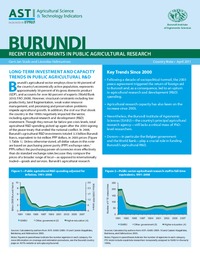Authors:
Stads, Gert-Jan; Ndimurirwo, Léonidas
Year:
2011
Publisher
International Food Policy Research Institute (IFPRI); and Burundi Institute of Agronomic Sciences (ISABU)
Back to:
The political turmoil that hit Burundi in 1993 wreaked havoc on the country’s agricultural R&D. Much of Burundi’s research infrastructure was damaged or destroyed, donors withdrew, and overall investment and capacity levels plummeted. It was not until the signing of the 2003 peace treaty that the country’s main donors (Belgium and the World Bank) returned to the scene, leading to a revival of agricultural R&D investment—albeit at a timid pace. In 2008, Burundi’s investments in agricultural R&D totaled 3.3 billion CFA francs (or 9.6 million dollars PPP, both in 2005 prices), which is still far below the levels recorded before the 1993 crisis. Agricultural research capacity levels have also shown an upward trend since 2003: in 2008, Burundi employed 98 FTE agricultural researchers.
Despite this slow recovery, a number of major challenges still need to be overcome. ISABU, Burundi’s main agricultural R&D agency, lacks a critical mass of PhD-qualified researchers. This is a serious impediment to running high-quality research programs and attracting external funding. Additionally, scientists do not consider ISABU to be an attractive employer mainly because its salaries are low compared to those offered by universities, NGOs, and international organizations. In December 2010, the national government responded to this challenge by modifying the status of ISABU’s researchers. The institute can now offer much higher salaries and there is hope that it will succeed in attracting and maintaining suitably qualified researchers.
Burundi’s agricultural sector has been severely weakened by the decade-long sociopolitical crisis and the harmful impact of climatic disturbances, which have become more frequent since 2000. Agricultural R&D can play a crucial role in helping to increase production and providing opportunities for rural populations to boost their incomes. This in turn will lead to greater food security and the alleviation of poverty. The onus is therefore on the Burundi government to define a precise set of national R&D priorities and develop a matching set of agricultural R&D programs to address these priorities in a relevant and coherent way. The realization of real progress necessarily implies long-term support from the national government, donors, and the private sector.

